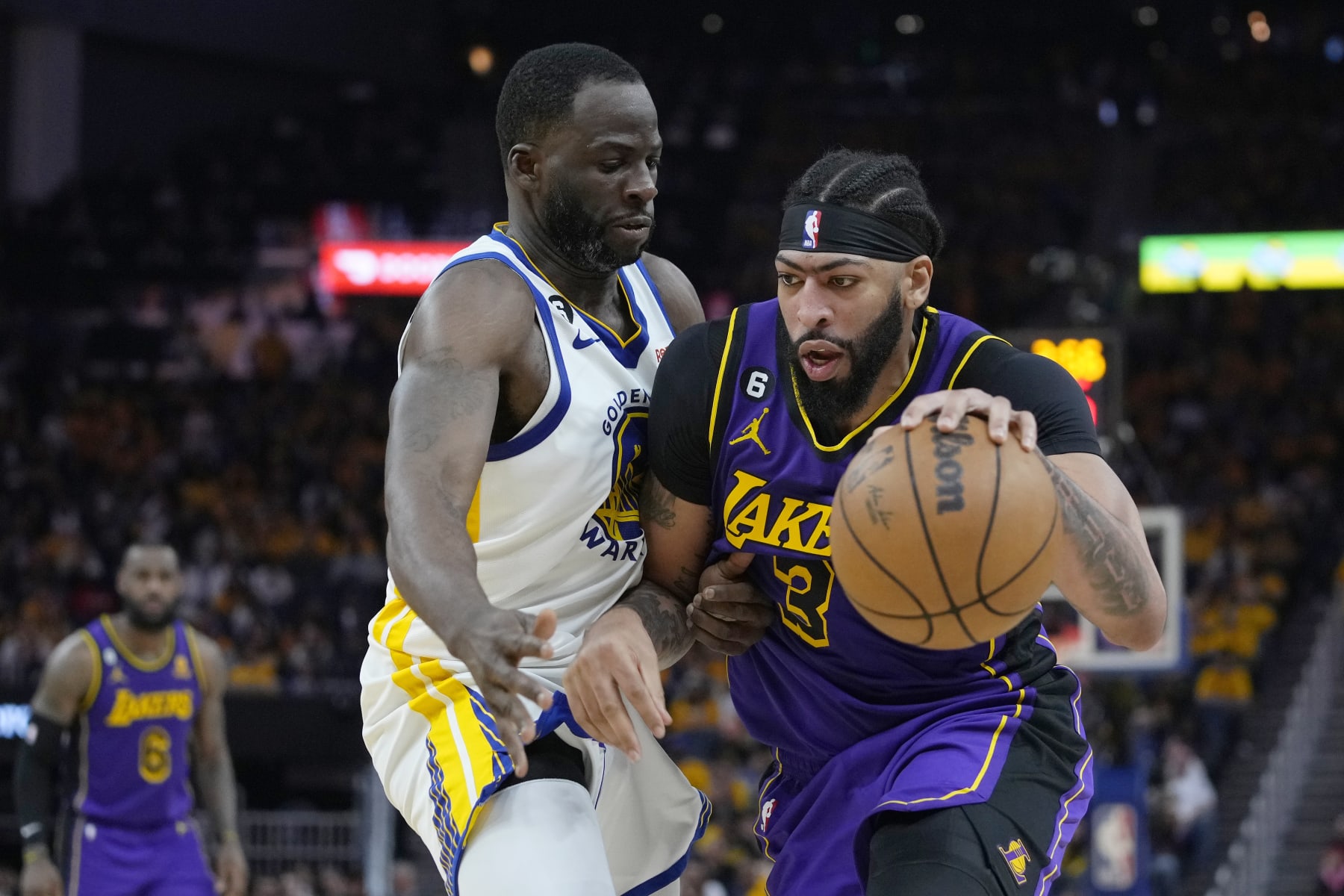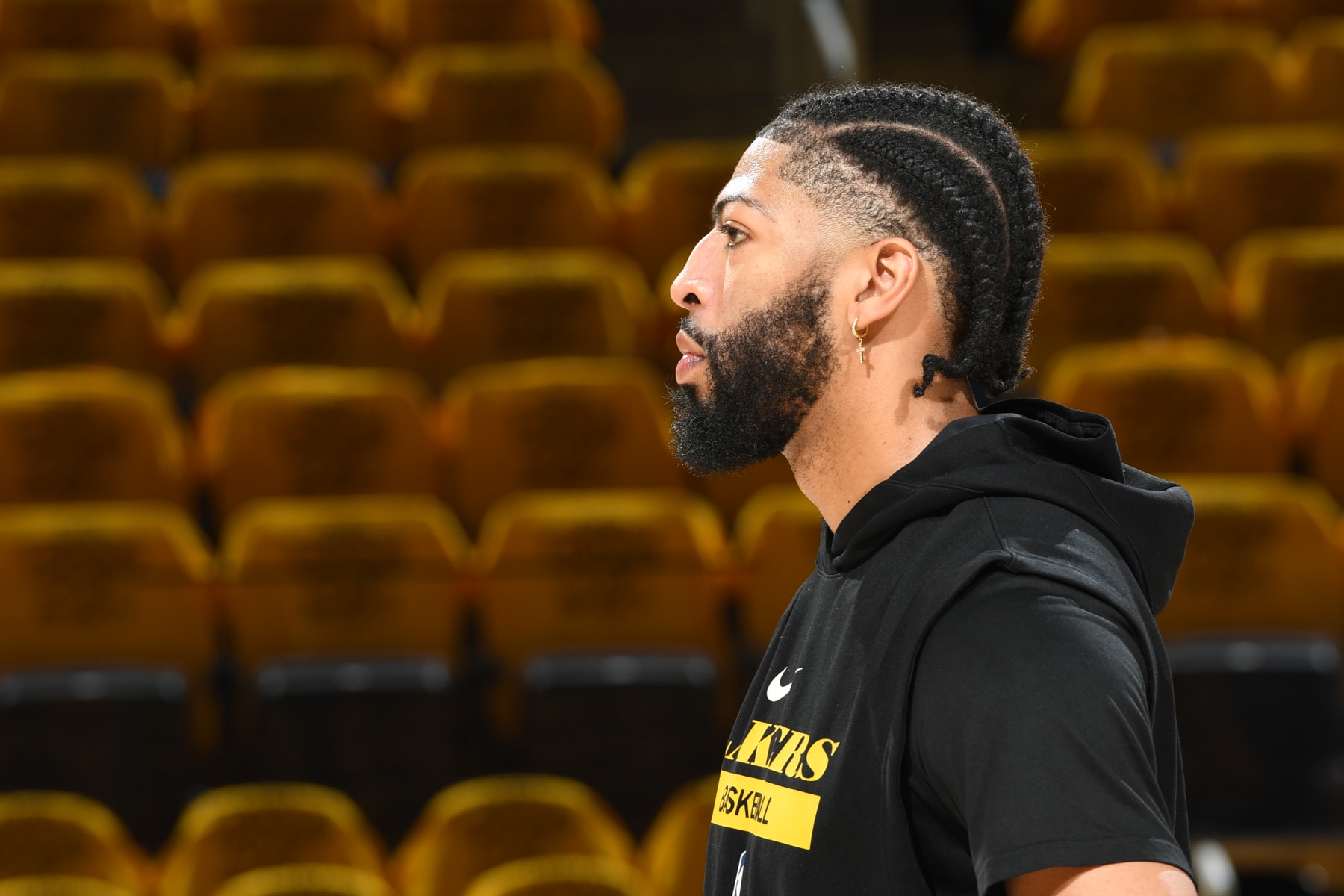Featured Video
Jokić Ready To Drink Beer 💀

L.A. Lakers Can't Afford Off-Nights From Anthony Davis
Anthony Davis' indispensability to the Los Angeles Lakers is a matter of fact—inarguable, without the need for any elaboration. And yet, there is also a backwards correlation between this significance and the scale at which its recognized.
When Davis is on, dominating at both ends, the Lakers look capable of competing with anyone, if not unstoppable. His larger importance in those moments and those games is a spectacular brand of undeniable. But when he's off, like really off, his value takes on a different, all-powerful clarity, reminding everyone that for as dangerous as the Lakers are with Peak AD, they are even more hopeless when he's someone less.
TOP NEWS

Nikola Jokic Told Aaron Gordon Not to Play with Injury in Nuggets vs. Thunder Game 7

2025 NBA Playoffs Eastern and Western Conference Finals Bold Predictions

Karl-Anthony Towns Rocks Shirt of Famous Knicks Fan at Mets vs. Yankees Game on Video
In Thursday's 127-100 beatdown at the hands of the Golden State Warriors, Davis was the latter. He dropped four assists, racked up three blocks and delivered a smattering of impactful defensive plays. For the most part, though, he was inconsequential on offense and appeared to be a meld of overstretched, exhausted and apathetic at the other end.
One-off duds can be quickly forgiven, even in the playoffs. But Game 2's relative flub is unsettling, if alarming, precisely because it's not some anomaly. It is instead the continuation of a start-and-stop trend in which Davis transitions from pure, utter, unimaginable dominance to debilitating lows.
This roller coaster ride has been most turbulent on the offensive end. Davis went from dropping 30 points on 19 shots in Game 1 to mustering just 11 points and 11 shots in Game 2. Similar peaks and valleys have plagued him all season—the entire playoffs included.
Just look at these ebbs and flows from L.A.'s first-round series against the Memphis Grizzlies:
- Game 1: 22 points on 17 shots
- Game 2: 13 points on 14 shots
- Game 3: 31 points on 24 shots
- Game 4: 12 points on 13 shots
- Game 5: 31 points on 23 shots
- Game 6: 16 points on nine shots
Game 2 against the Warriors marked the third time this postseason that Davis scored as many or fewer points than he attempted field goals. It is also the sixth time he finished with under five free throws after averaging nearly eight a night during the regular season.
Considering the Lakers are just eight games into their 2023 playoff run, yeah, this is a problem. And it's getting harder to explain.

Fatigue is no doubt an issue. Davis logged 44 minutes in Game 1 and played 33 of the first 36 minutes in Game 2 before sitting out the entire fourth quarter. Sustaining that workload while taking the court every other night is difficult, particularly given Davis' responsibilities at the defensive end.
Still, this is part of the superstar job description. It's the postseason. You're in Round 2. LeBron James is 38 and navigating a foot injury, and the Lakers are facing an opposing roster that necessitates Davis be his team's best player—not just occasionally, not even more than occasionally, but every single night.
To what end fatigue has impacted AD is also debatable. The Lakers have been wildly uninventive with how they use him on offense. Draymond Green did a masterful job guarding him on Thursday, but even head coach Darvin Ham copped to the need for more creativity:
Dumping the ball off to Davis at the top of the key is one thing when he's dicing up defenses from the perimeter. That's what he did in Game 1, connecting on nine of 14 two-pointers outside the restricted area. This approach fails to move the needle, venturing in detrimental territory, when AD doesn't have the jumper going. That was the case in Game 2, during which he wasn't nearly as aggressive and shot 4-of-10 on twos outside the restricted area.
The Lakers desperately need AD to get downhill. Almost 50 percent of his looks against the Grizzlies came inside the restricted area. That share has plunged below 14 percent against the Warriors. AD has attempted four total shots in the restricted area through two games.
Getting more looks at the basket isn't as simple as just speaking it into existence. Establishing deep position against Green is no easy feat. But too often AD catches the ball above the free-throw line and doesn't look to attack. Too often he doesn't roll off screens past the charity stripe. And too often it feels like he's not screening at all.
Demanding megastar offensive production out of Davis every single night is patently unfair. He is more play-finisher than shot-creator, which gives him limited agency over the Lakers' half-court system. More than that, he's already saddled with doing so much on the defensive end—as in, everything.
The scope of Davis' responsibilities were painfully evident in Game 2. The Warriors put the ball in Stephen Curry's hands more often and leaned into more screens both on and away from the ball.
Davis looked especially torn in the pick-and-roll. Hedging left the Lakers vulnerable behind him. Dropping meant he had to cover a ton of ground on closeouts.
There are nights in which Davis handles that duality, when he can be everywhere, all at once, equal parts rim protector and jump-shot disruptor. Thursday wasn't one of them.
The Lakers at large defended like they were wearing cinderblock shoes for much of the game. Davis wasn't the primary offender. His backline help was virtually nonexistent, and Jarred Vanderbilt's screen navigation left him in a gob of unwinnable situations. But he, too, retreated into invisibility for extended pockets before the end of the first half.
Credit the Warriors for making life hell on the Lakers in Game 2. They mixed up the rotation, including the starting five (Kevon Looney was under the weather), and baked in a ton of wrinkles at both ends of the floor. They got an exceptional Klay Thompson game, dynamite Steph (holy playmaking) and Dray games and an all-time JaMychal Green game. They won on Thursday more than L.A. lost.
And in many ways, the Lakers leave the Bay Area having turned in a job well done. They split a pair of tilts on the road. Home-court advantage is theirs. They will have an opportunity to adjust ahead of Saturday's Game 3.
At the same time, this was also the coldest of reality checks. LeBron had a hyper-efficient night from the floor (10-of-18), especially in the first half, and the Lakers barely made the Warriors sweat. The start of their unraveling came at the beginning of the second quarter, when Ham tried to rest AD for three minutes and found out he couldn't.
That is the Lakers' new world order in a nutshell. They not only need Davis to be their best player, but they need a very specific version of that best player.
And, fair or not, they need it more than every other game.
Unless otherwise noted, stats courtesy of NBA.com, Basketball Reference, Stathead or Cleaning the Glass. Salary information via Spotrac.
Dan Favale covers the NBA for Bleacher Report. Follow him on Twitter (@danfavale), and subscribe to the Hardwood Knocks podcast, co-hosted by Bleacher Report's Grant Hughes.






